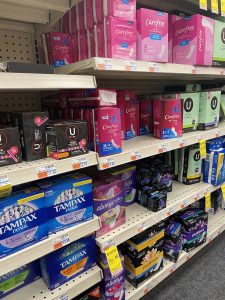After launching a pilot program last year, the Montgomery County Public School system says it is ahead of schedule in its plan to place free menstrual product dispensers in all school bathrooms, with the goal of outfitting every campus with at least one dispenser by October 2025.
The plan builds on existing progress throughout the county, which MCPS officials say placed five dispensers in every high school and three in nearly every middle school under its jurisdiction since 2021. MCPS is now looking to install dispensers in remaining middle schools and begin stocking elementary schools.
“All of our 25 high schools have at least five dispensers to date in each school, and of course the products are free,” said MCPS Communications Director Chris Cram. “The next was to move to middle schools. When that part of the project is done, at least three student restrooms in each of the middle schools will ultimately have these dispensers.”
After successfully equipping each Montgomery County high school with menstrual health products, Cram said the department moved forward with its plan to place dispensers in White Oak Middle School and Montgomery Village Middle School in January of last year. The initial plan, according to a newsletter issued by the school district, was to place two dispensers in every middle and high school and one in every elementary school by the summer of 2022.
MCPS took a different route, Cram said. The district chose first to fully stock each high school with the five dispensers the initiative called for before shifting its focus to middle and elementary schools, with White Oak and Montgomery Village leading the way.

The decision paid dividends for MCPS, Cram said, with the school system eyeing the end of the 2023-2024 academic year as a target date to install three dispensers in each middle school and one in every elementary school.
“I think we’re on a path to do it far more quickly than that,” Cram said. “We seem to indicate that we will very likely be done by the end of this next school year, mostly done this year.”
The move by MCPS builds on a 2021 law passed by the Maryland state legislature. The state law, introduced as HB 0205, mandates all middle and high schools provide free menstrual products to students by 2025 and comes as Montgomery County Councilmember Will Jawando introduced a bill (Bill 42-23) in November requiring the county to install free menstrual product dispensers in public women’s bathrooms by the same year.
Montgomery County residents have expressed concerns regarding a lack of access to affordable menstrual health products.
County Board of Education Ombudsman Ryvell Fitzpatrick said the general public had urged municipal lawmakers to make tampons more readily accessible to MCPS students during public meetings that pre-dated the 2021 ordinance.
“People did come in and provide public comment at board meetings,” Fitzpatrick said. “There was definitely the request from the community.”
Montgomery County’s push for menstrual healthcare equity represents another step in what George Washington University School of Nursing’s Senior Policy Professor Diana Mason called a global movement to provide free period products to women and girls.
First conceived in Great Britain, Mason said programs to reduce the cost of menstrual health care have yielded positive results in Europe and could serve as a model for both Montgomery County and the United States.
“This was first identified I believe in Scotland in the UK,” Mason said. “It has enabled women and girls to not miss as much school and work. It has reduced or eliminated the barrier of the cost of menstrual products in public places for girls and women.”

Mason, who co-authored a study on menstrual inequality, said lack of access to proper menstrual hygienic products most directly impacts women and girls from working class backgrounds, creating a school and work attendance gap which further exacerbates socioeconomic inequality.
“We know that there are some girls who, when they have their periods, if they don’t have menstrual products will not go to school,” Mason said. “We know that for some women who are particularly in low-income jobs, that if they don’t have menstrual products, they may miss work.”
Beyond the financial and education implications of lacking access to proper menstrual hygiene, insufficient period healthcare can prove deadly.
Mason said women who cannot afford menstrual healthcare frequently find themselves rationing or recycling tampons, which is a leading cause of toxic shock syndrome a potentially lethal condition caused by bacteria.
“Menstrual hygiene is an issue,” Mason said. “We know that toxic shock syndrome is a consequence of superabsorbent tampons. If you if have limited access to tampons, you might decide ‘I’m not going to change my tampon. I’m just going to keep it in.’ Well, you’re putting yourself at risk of toxic shock syndrome, which can kill.”
To Mason, initiatives such as HB 0205 and MCPS swift response to the law mark a turning point not only in economic equality for women, but greater gender equality overall.
According to a report from Duquesne University, the average price of a box of tampon is roughly $7, but prices can climb as high as $30 through chain vendors like Walmart depending on the brands and stores women buy from — a frequent expense men are spared from.
As a medical professional, Mason observed men are frequently given non-essential grooming products free of charge. She is hopeful laws such as HB 0205 will play a part leveling the financial playing field.
“It’s in it’s sort of crazy because so I am a nurse, and in hospitals we provide men with shaving products for free, right, and menstrual products are often charged for,” Mason said.















Add comment